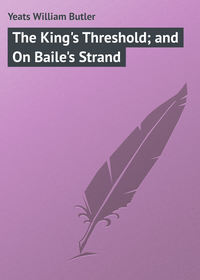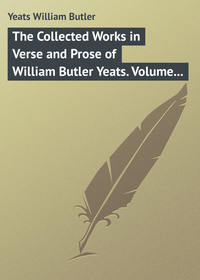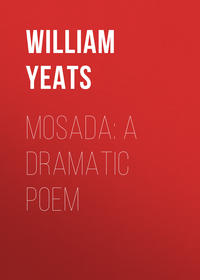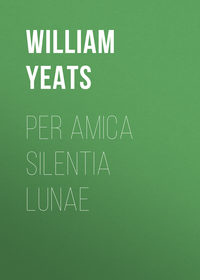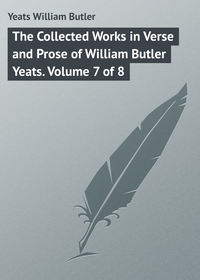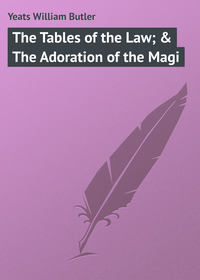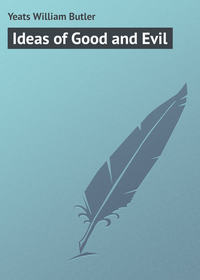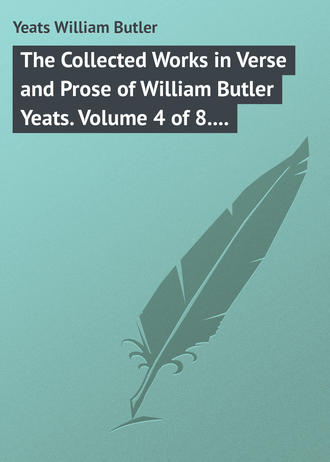 полная версия
полная версияThe Collected Works in Verse and Prose of William Butler Yeats. Volume 4 of 8. The Hour-glass. Cathleen ni Houlihan. The Golden Helmet. The Irish Dramatic Movement
‘I have come from a far country to learn about Him,’ said the child. ‘Will your honour direct me to the best school that they have in these parts?’
‘The best school and the best teacher is close by,’ said the priest, and he named himself.
‘Oh, not to that man,’ answered the child, ‘for I am told he denies God and Heaven and Hell, and even that man has a soul, because we can’t see it; but I would soon put him down.’
The priest looked at him earnestly. ‘How?’ he inquired.
‘Why,’ said the child, ‘I would ask him if he believed he had life to show me his life.’
‘But he could not do that, my child,’ said the priest. ‘Life cannot be seen; we have it, but it is invisible.’
‘Then, if we have life, though we cannot see it, we may also have a soul, though it is invisible,’ answered the child.
When the priest heard him speak these words he fell down on his knees before him, weeping for joy, for now he knew his soul was safe; he had met at last one that believed. And he told the child his whole story: all his wickedness, and pride, and blasphemy against the great God; and how the angel had come to him and told him of the only way in which he could be saved, through the faith and prayers of some one that believed.
‘Now, then,’ he said to the child, ‘take this penknife and strike it into my breast, and go on stabbing the flesh until you see the paleness of death on my face. Then watch – for a living thing will soar up from my body as I die, and you will then know that my soul has ascended to the presence of God. And when you see this thing, make haste and run to my school and call on all my scholars to come and see that the soul of their master has left the body, and that all he taught them was a lie, for that there is a God who punishes sin, and a Heaven and a Hell, and that man has an immortal soul, destined for eternal happiness or misery.’
‘I will pray,’ said the child, ‘to have courage to do this work.’
And he kneeled down and prayed. Then when he rose up he took the penknife and struck it into the priest’s heart, and struck and struck again till all the flesh was lacerated; but still the priest lived, though the agony was horrible, for he could not die until the twenty-four hours had expired. At last the agony seemed to cease, and the stillness of death settled on his face. Then the child, who was watching, saw a beautiful living creature, with four snow-white wings, mount from the dead man’s body into the air and go fluttering round his head.
So he ran to bring the scholars; and when they saw it they all knew it was the soul of their master, and they watched with wonder and awe until it passed from sight into the clouds.
And this was the first butterfly that was ever seen in Ireland; and now all men know that the butterflies are the souls of the dead waiting for the moment when they may enter Purgatory, and so pass through torture to purification and peace.
But the schools of Ireland were quite deserted after that time, for people said, What is the use of going so far to learn when the wisest man in all Ireland did not know if he had a soul till he was near losing it; and was only saved at last through the simple belief of a little child?
The Hour-Glass was first played in The Molesworth Hall, Dublin, with the following cast: – Wise Man, Mr. T. Dudley Digges; His Wife, Miss M. T. Quinn; The Fool, Mr. F. J. Fay; Pupils, P. J. Kelly, P. Columb, C. Caufield.
We always play it in front of an olive-green curtain, and dress the Wise Man and his Pupils in various shades of purple. Because in all these decorative schemes one needs, as I think, a third colour subordinate to the other two, we have partly dressed the Fool in red-brown, which is repeated in the furniture. There is some green in his dress and in that of the Wife of the Wise Man who is dressed mainly in purple.
One sometimes has need of more lines of the little song, and I have put into English rhyme three of the many verses of a Gaelic ballad:
I was going the road one day(O the brown and the yellow beer!)And I met with a man that was no right man(O my dear, my dear).‘Give me your wife,’ said he,(O the brown and the yellow beer!)‘Till the sun goes down and an hour of the clock’(O my dear, my dear).‘Good-bye, good-bye, my husband,’(O the brown and the yellow beer!)‘For a year and a day by the clock of the sun’(O my dear, my dear).APPENDIX II
CATHLEEN NI HOULIHAN
My dear Lady Gregory, —
When I was a boy I used to wander about at Rosses Point and Ballisodare listening to old songs and stories. I wrote down what I heard and made poems out of the stories or put them into the little chapters of the first edition of The Celtic Twilight, and that is how I began to write in the Irish way.
Then I went to London to make my living, and though I spent a part of every year in Ireland and tried to keep the old life in my memory by reading every country tale I could find in books or old newspapers, I began to forget the true countenance of country life. The old tales were still alive for me indeed, but with a new, strange, half-unreal life, as if in a wizard’s glass, until at last, when I had finished The Secret Rose, and was half-way through The Wind Among the Reeds, a wise woman in her trance told me that my inspiration was from the moon, and that I should always live close to water, for my work was getting too full of those little jewelled thoughts that come from the sun and have no nation. I had no need to turn to my books of astrology to know that the common people are under the moon, or to Porphyry to remember the image-making power of the waters. Nor did I doubt the entire truth of what she said to me, for my head was full of fables that I had no longer the knowledge and emotion to write. Then you brought me with you to see your friends in the cottages, and to talk to old wise men on Slieve Echtge, and we gathered together, or you gathered for me, a great number of stories and traditional beliefs. You taught me to understand again, and much more perfectly than before, the true countenance of country life.
One night I had a dream almost as distinct as a vision, of a cottage where there was well-being and firelight and talk of a marriage, and into the midst of that cottage there came an old woman in a long cloak. She was Ireland herself, that Cathleen ni Houlihan for whom so many songs have been sung and about whom so many stories have been told and for whose sake so many have gone to their death. I thought if I could write this out as a little play I could make others see my dream as I had seen it, but I could not get down out of that high window of dramatic verse, and in spite of all you had done for me I had not the country speech. One has to live among the people, like you, of whom an old man said in my hearing, ‘She has been a serving-maid among us,’ before one can think the thoughts of the people and speak with their tongue. We turned my dream into the little play, Cathleen ni Houlihan, and when we gave it to the little theatre in Dublin and found that the working-people liked it, you helped me to put my other dramatic fables into speech. Some of these have already been acted, but some may not be acted for a long time, but all seem to me, though they were but a part of a summer’s work, to have more of that countenance of country life than anything I have done since I was a boy.
W. B. Yeats.Feb., 1903.
This play was first played on April 2, 1902, in St. Teresa’s Hall, Dublin, with the following cast: – Cathleen, Miss Maude Gonne; Delia Cahel, Miss Maire nic Sheublagh; Bridget Gillan, Miss M. T. Quinn; Patrick Gillan, Mr. C. Caufield; Michael Gillan, Mr. T. Dudley Digges; Peter Gillan, Mr. W. G. Fay.
Miss Maude Gonne played very finely, and her great height made Cathleen seem a divine being fallen into our mortal infirmity. Since then the part has been twice played in America by women who insisted on keeping their young faces, and one of these when she came to the door dropped her cloak, as I have been told, and showed a white satin dress embroidered with shamrocks. Upon another, – or was it the same occasion? – the player of Bridget wore a very becoming dress of the time of Louis the Fourteenth. The most beautiful woman of her time, when she played my Cathleen, ‘made up’ centuries old, and never should the part be played but with a like sincerity. This was the first play of our Irish School of folk-drama, and in it that way of quiet movement and careful speech which has given our players some little fame first showed itself, arising partly out of deliberate opinion and partly out of the ignorance of the players. Does art owe most to ignorance or to knowledge? Certainly it comes to its deathbed full of knowledge. I cannot imagine this play, or any folk-play of our school, acted by players with no knowledge of the peasant, and of the awkwardness and stillness of bodies that have followed the plough, or too lacking in humility to copy these things without convention or caricature.
The lines beginning ‘Do not make a great keening’ and ‘They shall be remembered for ever’ are said or sung to an air heard by one of the players in a dream. This music is with the other music at the end of the third volume.
APPENDIX III
THE GOLDEN HELMET
The Golden Helmet was produced at the Abbey Theatre on March 19, 1908, with the following cast: – Cuchulain, J. M. Kerrigan; Conal, Arthur Sinclair; Leagerie, Fred. O’ Donovan; Laeg, Sydney Morgan; Emer, Sara Allgood; Conal’s Wife, Maire O’Neill; Leagerie’s Wife, Eileen O’ Doherty; Red Man, Ambrose Power; Horseboys, Scullions, and Black Men, S. Hamilton, T. J. Fox, U. Wright, D. Robertson, T. O’Neill, I. A. O’Rourke, P. Kearney.
In performance we left the black hands to the imagination, and probably when there is so much noise and movement on the stage they would always fail to produce any effect. Our stage is too small to try the experiment, for they would be hidden by the figures of the players. We staged the play with a very pronounced colour-scheme, and I have noticed that the more obviously decorative is the scene and costuming of any play, the more it is lifted out of time and place, and the nearer to faeryland do we carry it. One gets also much more effect out of concerted movements – above all, if there are many players – when all the clothes are the same colour. No breadth of treatment gives monotony when there is movement and change of lighting. It concentrates attention on every new effect and makes every change of outline or of light and shadow surprising and delightful. Because of this one can use contrasts of colour, between clothes and background, or in the background itself, the complementary colours for instance, which would be too obvious to keep the attention in a painting. One wishes to make the movement of the action as important as possible, and the simplicity which gives depth of colour does this, just as, for precisely similar reasons, the lack of colour in a statue fixes the attention upon the form.
The play is founded upon an old Irish story, The Feast of Bricriu, given in Cuchulain of Muirthemne, and is meant as an introduction to On Baile’s Strand.
APPENDIX IV
DATES AND PLACES OF THE FIRST PERFORMANCE OF NEW PLAYS PRODUCED BY THE NATIONAL THEATRE SOCIETY AND ITS PREDECESSORS: —
1899Irish Literary Theatre at Antient Concert Rooms
May 8th. The Countess Cathleen, by W. B. Yeats.
May 9th. The Heather Field, by Edward Martyn.
1900Irish Literary Theatre at the Gaiety TheatreFeb. 19th. The Last Feast of the Fianna, by Alice Milligan.
Maeve, by Edward Martyn.
Feb. 20th. The Bending of the Bough, by George Moore.
1901Oct. 21st. Diarmuid and Grania, by W. B. Yeats and George Moore.
The Twisting of the Rope, by Douglas Hyde (first Gaelic play produced in a theatre).
1902Mr. W. G. Fay’sIrish National Dramatic Companyat St. Teresa’s Hall, Clarendon StreetApril 2nd. Deirdre, by ‘A.E.’
Cathleen ni Houlihan, by W. B. Yeats.
Irish National Dramatic Companyat Antient Concert RoomsOct. 29th. The Sleep of the King, by Seumas O’Cuisin.
The Laying of the Foundations, by Fred Ryan.
Oct. 30th. A Pot of Broth, by W. B. Yeats.
Oct. 31st. The Racing Lug, by Seumas O’Cuisin.
1903Irish National Theatre Society, Molesworth HallMarch 14th. The Hour-Glass, by W. B. Yeats.
Twenty-five, by Lady Gregory.
Oct. 8th. The King’s Threshold, by W. B. Yeats.
In the Shadow of the Glen, by J. M. Synge.
Dec. 3rd. Broken Soil, by P. Colm.
1904Jan. 14th. The Shadowy Waters, by W. B. Yeats.
The Townland of Tamney, by Seumas MacManus.
Feb. 25th. Riders to the Sea, by J. M. Synge.
Irish National Theatre Society at the Abbey TheatreDec. 27th. On Baile’s Strand, by W. B. Yeats.
Spreading the News, by Lady Gregory.
1905Feb. 4th. The Well of the Saints, by J. M. Synge.
March 25th. Kincora, by Lady Gregory.
April 25th. The Building Fund, by William Boyle.
June 9th. The Land, by P. Colm.
National Theatre Society, LtdDec. 9th. The White Cockade, by Lady Gregory.
1906Jan. 20th. The Eloquent Dempsey, by William Boyle.
Feb. 19th. Hyacinth Halvey, by Lady Gregory.
Oct. 20th. The Gaol Gate, by Lady Gregory.
The Mineral Workers, by William Boyle.
Nov. 24th. Deirdre, by W. B. Yeats.
Dec. 8th. The Shadowy Waters (new version), by W. B. Yeats.
The Canavans, by Lady Gregory.
1907Jan. 26th. The Playboy of the Western World, by J. M. Synge.
Feb. 23rd. The Jackdaw, by Lady Gregory.
March 9th. Rising of the Moon, by Lady Gregory.
April 1st. The Eyes of the Blind, by Miss W. M. Letts.
April 3rd. The Poorhouse, by Lady Gregory and Douglas Hyde.
April 27th. Fand, by Wilfred Scawen Blunt.
Oct. 3rd. The Country Dressmaker, by George Fitzmaurice.
Oct. 31st. Dervorgilla, by Lady Gregory.
The Canavans (new version), by Lady Gregory.
Nov. 21st.
The Unicorn from the Stars, by Lady Gregory and W. B. Yeats.
1908Feb. 15th. The Man who Missed the Tide, by W. F. Casey.
The Piper, by Norreys Connell.
March 19th. The Pie-dish, by George Fitzmaurice.
The Golden Helmet, by W. B. Yeats.
April 20th. The Workhouse Ward, by Lady Gregory.
In addition to these plays, many of which are constantly revived, translations of foreign masterpieces are given occasionally.
It was not until the opening of the Abbey Theatre that Lady Gregory, Mr. J. M. Synge, and Mr. W. B. Yeats became entirely responsible for the selection of plays, though they had been mainly so from 1903.
Corrigenda.– P. 120, l. 5, for ‘severe’ read ‘serious’; p. 143, l. 4, for ‘prepared’ read ‘performed’; p. 176, l. 29, for ‘their own day’ read ‘our own day.’
1
Both Mr. Moore and Mr. Martyn dropped out of the movement after the third performance at the Irish Literary Theatre in 1901. – W.B.Y.
2
That mood has gone, with Fenianism and its wild hopes. The National movement has been commercialized in the last few years. How much real ideality is but hidden for a time one cannot say. – W.B.Y., March, 1908.
3
An illusion, as he himself explained to me. He had never seen Phèdre. The players were quiet and natural, because they did not know what else to do. They had not learned to go wrong. – W.B.Y., March, 1908.
4
This play was John Bull’s Other Island. When it came out in the spring of 1905 we felt ourselves unable to cast it without wronging Mr. Shaw. We had no ‘Broadbent’ or money to get one. – W.B.Y., March, 1908.
5
The Poor House, written in Irish by Dr. Hyde on a scenario by Lady Gregory.
6
Riders to the Sea. This play made its way very slowly with our audiences, but is now very popular. – W.B.Y., March, 1908.
7
The players, though not the playwrights, are now all paid. – W.B.Y., March, 1908.
8
John Bull’s Other Island.
9
Mr. Boyle has since left us as a protest against the performance of Mr. Synge’s Playboy of the Western World. – W.B.Y., March, 1908.
10
This essay was written immediately after the opening of the Abbey Theatre, though it was not printed, through an accident, until the art of the Abbey has become an art of peasant comedy. It tells of things we have never had the time to begin. We still dream of them. – W.B.Y., March, 1908.
11
I have heard musicians excuse themselves by claiming that they put the words there for the sake of the singer; but if that be so, why should not the singer sing something she may wish to have by rote? Nobody will hear the words; and the local time-table, or, so much suet and so many raisins, and so much spice and so much sugar, and whether it is to be put in a quick or a slow oven, would run very nicely with a little management.
12
The Arrow, a briefer chronicle than Samhain, was distributed with the programme for a few months.


